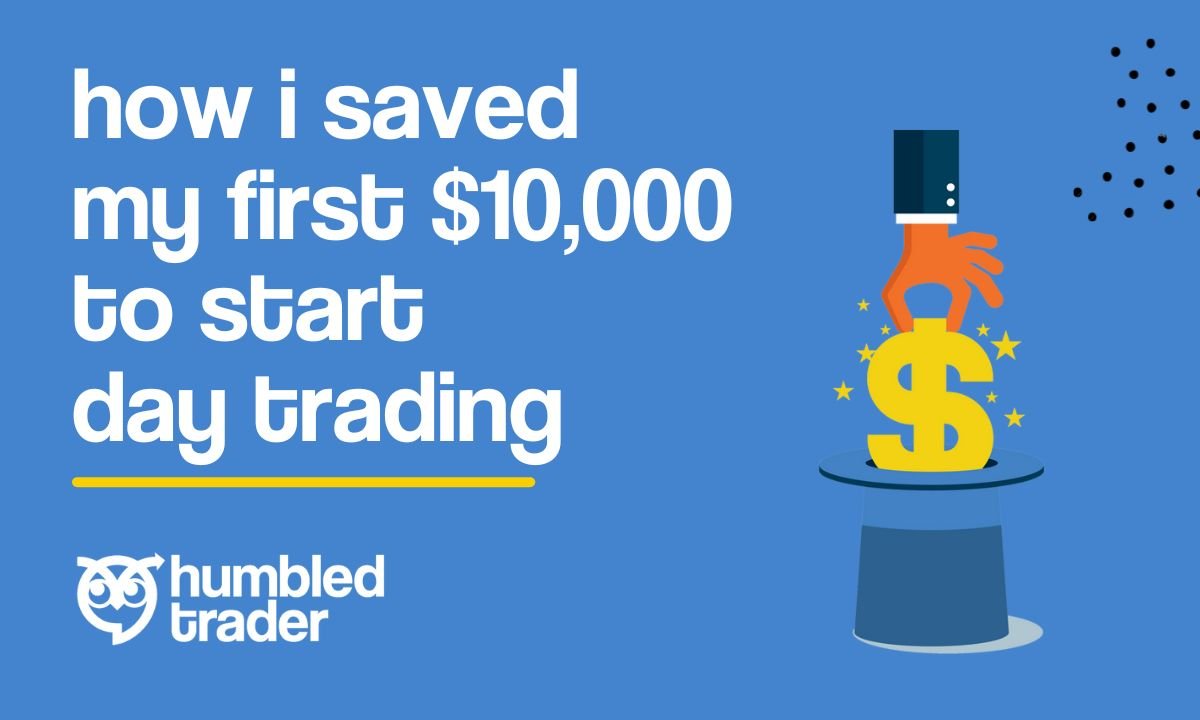How I Saved My First $10,000 To Start Day Trading

So you want to learn to trade and make that Lamborghini money…. But here’s a problem. You don’t have at least $4000 to start day trading.
According to GOBankingRates, 69% of Americans have less than $1,000 in savings.
Having regular money-saving routines is important especially if you want to eventually use that money to start day trading. It is not easy but it is possible. I personally started this savings journey when I was making $10/hour in high school.
Today, I’ll be sharing the step-by-step money-saving strategy that I used to save my first $10,000 in order to trade within 6 months. If you’re looking to start this day trading journey and funding your first trading account, this is a must-read.
My journey:
My money-saving journey started well before I even knew about the stock market. While most personal finance gurus would recommend cutting back on $5 coffees, I believe that's just a small piece of the equation. My approach since I was in my early 20s was mostly focused on… making more money.
I’ve always had multiple part-time jobs when I was in high school, such as an art tutor, a Tim Hortons Barista, and other miscellaneous jobs at the food court. The spirit of making money from side hustles has always been natural to me. When I decided to get ready to fund a trading account in my early 20s, I did similar steps and had multiple side hustles outside my 9-7 job in order to speed up my savings.
The mindset that I preach to you today is still the same mindset I had 8 years ago!
I know what some of you are thinking… come on Humbled Trader, you can fund an account in Robinhood with $100 now.
Yes, nowadays you can open a trading account with less than $1000 but back then I wanted to be conservative and have more room for error. I didn’t want to trade with the last $1000 I had in my bank account, and have any trading losses potentially affecting my daily expenses.
I wanted to open a trading account with at least $4000 after keeping a comfortable amount of savings. I lived frugally and cut my monthly spending. Finally, 6 months later, I saved up $10,000 in cash. I was finally able to comfortably take out a portion of that cash to fund my first trading account.
So this was my strategy:
Step 1: Create a budget.
You need to figure out your fixed costs! Fixed expenses are all the must-spend items and services that you need to maintain your basic standards of living each month. They include rent, groceries, food, insurance, utilities, loan repayments, and of course, my monthly Lambo payments (just kidding).
This is what my monthly expenses looked like back then:
$800 on rent, $200 on dining out, $150 on groceries, $100 on gas, $200 on a car lease, $100 on student loan payments, and around $200 per month for miscellaneous expenses (or unexpected expenses).
That adds up to about $1750 USD per month of monthly living expenses… keep in mind this was prior to the 9 % inflation figures… *cough cough*
Now that we have the monthly expenses tallied up, it's time to create a budget out of those fixed expenses and start tracking all the money coming in and out.
There are many websites and free apps out there that allow you to track your personal spending. I personally use a free budget & expense tracker like Mint by Intuit to track all of my expenses each month. It doesn’t matter whether you use an automated tracking system as I did or a DIY excel spreadsheet, as long as you do whatever works easiest for you to categorize all your spending, and thereafter, is where you can optimize the tracked figures to set monthly saving goals for yourself.
Step 2: Set specific saving goals.
With the information we gathered in step 1, we can now create a plan to save that $10,000. I was making about $2500 after-tax each month living in California, which means that I was saving roughly $800 after my expenses each month.
Take $10,000 divided by $800… It would take me more than 1 year to make $10,000. I knew that it would take too long at this rate. I was already paper trading and studying the market at that time so I wanted to be able to fund a real account way sooner, ideally within 6 months.
At the same time, my employment income from my 9-7 VFX job was not stable. There were months when I only had work for 2 or 3 weeks. So I knew I needed to look for alternatives to increase my income in order to steadily save $10,000 at a faster pace.
Very important here - don’t quit your job right away to day trade. Small or unstable, you still need that basic income to support yourself or your family, especially in the early stages of saving up to fund your trading account.
Step 3: Earn more money from side hustles.
Hustling on the side has never been foreign to me. I had multiple part-time jobs while in high school and college. Being experienced in finding alternative ways to make money, I began to get creative. I started following a few subreddits like r/churning and r/churning Canada. These subreddits are for enthusiasts who want to hack the ‘credit card points’ game and banking bonus system.
I used to focus on getting the sign-up bonus cash by opening new bank accounts. At big banks like TD, RBC, and CIBC in Canada, rewarding new customers up to $500 is common when a new account is created and set up for pre-authorized payments. I found this method extremely simple to perform online even though I was in California. I racked up 3-5 cash bonuses, totaling over $1500 in three months.
Think outside the box.
I also joined forces with another friend, a fellow VFX designer struggling to find side hustles. We would pick furniture from Craigslist or garage sales in the wealthy areas of Los Angeles for pennies on the dollar or for free. Some of the sellers were so rich that they really didn’t care about making money… they just wanted people to get rid of the furniture. We would clean up and decorate the furniture, take new photos and resell them online for 2, 3, and sometimes 10X our purchasing cost. It was actually a really fun and lucrative hustle with my friend, which made me a bit more than $2000 over the course of 6 months.
I also started a design freelance service on the side. Although it was challenging to find a steady job in VFX and animation industry, it was fairly easy for me to find short-term contracts as a designer for mobile games and commercials. Sometimes, I was juggling 3-4 projects at the same time. It required a lot of manual labor and was not really scalable, however, I was still able to make an extra $500 to $1000 cash a month.
Step 4: Live below your means.
As I mentioned, I think it is best to prioritize expanding income, rather than trying to save pennies. However, getting into the habit of living below your means is also a great way to help us stay on track with our saving goal of $10,000.
When I first moved to LA, I got into the habit of partying 4 nights a week, crunching, and dining out every other day. This habit was extremely harmful to the wallet. I didn’t know I was spending that much until I started budgeting, as we did in step 1.
I resorted to cooking at home more, and cutting back on eating out, ordering deliveries, and partying (or only going to house parties rather than clubs). This helped a lot as I was no longer paying for $6 waters or $15 shots. I even terminated my car lease at that time and started taking public transit and rode my bike to work. Besides, I was a single young twenty-ish year old that just graduated from college. Life was just simpler back then, and I had no kids… and eh, no one would be that surprised if I slept on a mattress on the floor.
I managed to save $10,000 cash within 6 months.
With steps 1 to 4, I created a budget, set specific savings goals, and aggressively increased my income with side hustles, and living below my means. I was able to save $10,000 cash within 6 months.
It definitely wasn't easy. I had to make a lot of sacrifices, worked evenings and nights, and cut back on a lot of going out and spending in general in order to get to my first $10,000 savings. Hopefully, this shows you that it is possible to save $10,000 to start day trading as long as you set your mind to it.
Don’t feel like reading? Watch the video.


